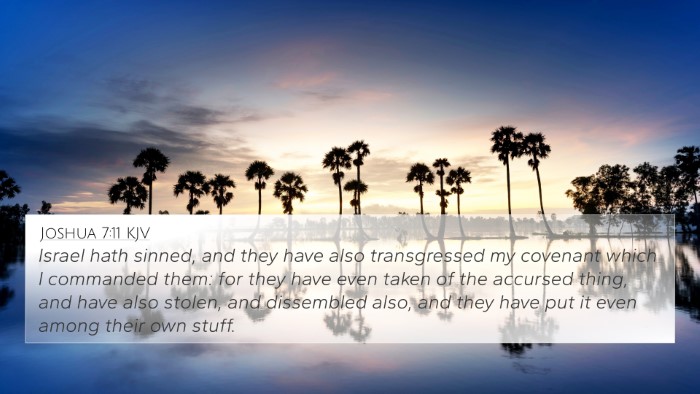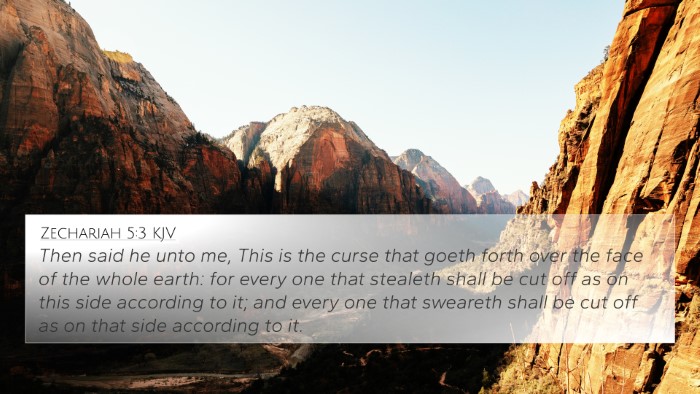Understanding 2 Kings 5:24
Bible Verse: 2 Kings 5:24 - "And when he came to the tower, he took them from their hand, and bestowed them in the house: and he let the men go, and they departed."
Summary of Insights
This verse takes place after the account of Naaman, a Syrian commander who was healed of leprosy by the prophet Elisha. Elisha’s servant, Gehazi, sought to profit from this healing and chased after Naaman to acquire gifts under false pretenses. Here, we analyze the implications of Gehazi's actions and their relevance in the context of obedience, integrity, and the consequences of covetousness.
Commentary Insights
- Matthew Henry: Henry highlights Gehazi's deceitfulness and the danger of greed. He points out that Gehazi, driven by the desire for wealth, acted against Elisha’s instructions, which emphasize honesty and trust in God’s provision.
- Albert Barnes: Barnes elaborates on the significance of the 'tower' mentioned. He connects it to a place of observation, suggesting that Gehazi’s actions reflect a sense of secrecy and shame, emphasizing that God sees all, and Gehazi’s deceit would soon catch up to him.
- Adam Clarke: Clarke comments on the importance of the gifts received from Naaman. He critiques Gehazi's unfaithfulness and warns of the destructive power of avarice, noting that such actions not only jeopardize one’s own integrity but also lead to spiritual decline.
Biblical Context
This narrative is crucial in understanding themes of integrity, the dangers of materialism, and divine justice. Gehazi's story serves as a moral lesson highlighting the importance of faith over material gain.
Cross-References
This verse can be understood in light of several other scriptures that deal with themes of honesty, greed, and the consequences of deceit:
- 1 Timothy 6:10: “For the love of money is the root of all evil...” - This relates to Gehazi's desire for riches.
- Luke 12:15: “Take heed and beware of covetousness...” - A direct warning against the pitfalls of greed.
- Proverbs 28:22: “A man with an evil eye hastens after riches...” - Illustrates the dangers of hastiness in pursuing wealth.
- Acts 8:20: “Your money perish with you, because you thought the gift of God could be purchased...” - Emphasizes the futility of trying to buy spiritual blessings.
- Joshua 7:21: “When I saw among the spoils a goodly Babylonish garment...” - A connection to the consequences of covetous desires leading to sin.
- Exodus 20:17: “You shall not covet...” - This commandment highlights the moral point against Gehazi's actions.
- James 4:2: “You desire and do not have; you murder and covet and cannot obtain...” - Reinforces the dangers associated with unbridled desires.
Thematic Connections
In the broader narrative of Scripture, 2 Kings 5:24 connects to numerous teachings that emphasize the importance of maintaining integrity, the dangers of corruption, and the consequences of straying from God’s commands:
- Integrity and Trust: 2 Corinthians 8:21 speaks to doing things honestly not only in the sight of the Lord but also in the sight of men.
- Consequences of Sin: Galatians 6:7 reminds us that a man reaps what he sows, paralleling Gehazi's eventual downfall.
- Faith vs. Materialism: Matthew 6:24 shows that one cannot serve God and wealth, relating to Gehazi's choice.
Conclusion
The lesson from 2 Kings 5:24 serves as a powerful reminder of the perils associated with greed and deceit. Gehazi’s actions highlight how a desire for material gain can lead one away from God's intended blessing. Further exploration of cross-references and related verses yields a comprehensive understanding of this narrative's implications on faith, integrity, and the moral conduct expected of believers.
Further Study
For those interested in diving deeper into cross-referencing Biblical texts and understanding interconnected themes, it is beneficial to employ tools like a Bible concordance or a cross-reference Bible study guide. These resources aid in identifying connections between verses, facilitating a richer, more nuanced interpretation of Scripture.









